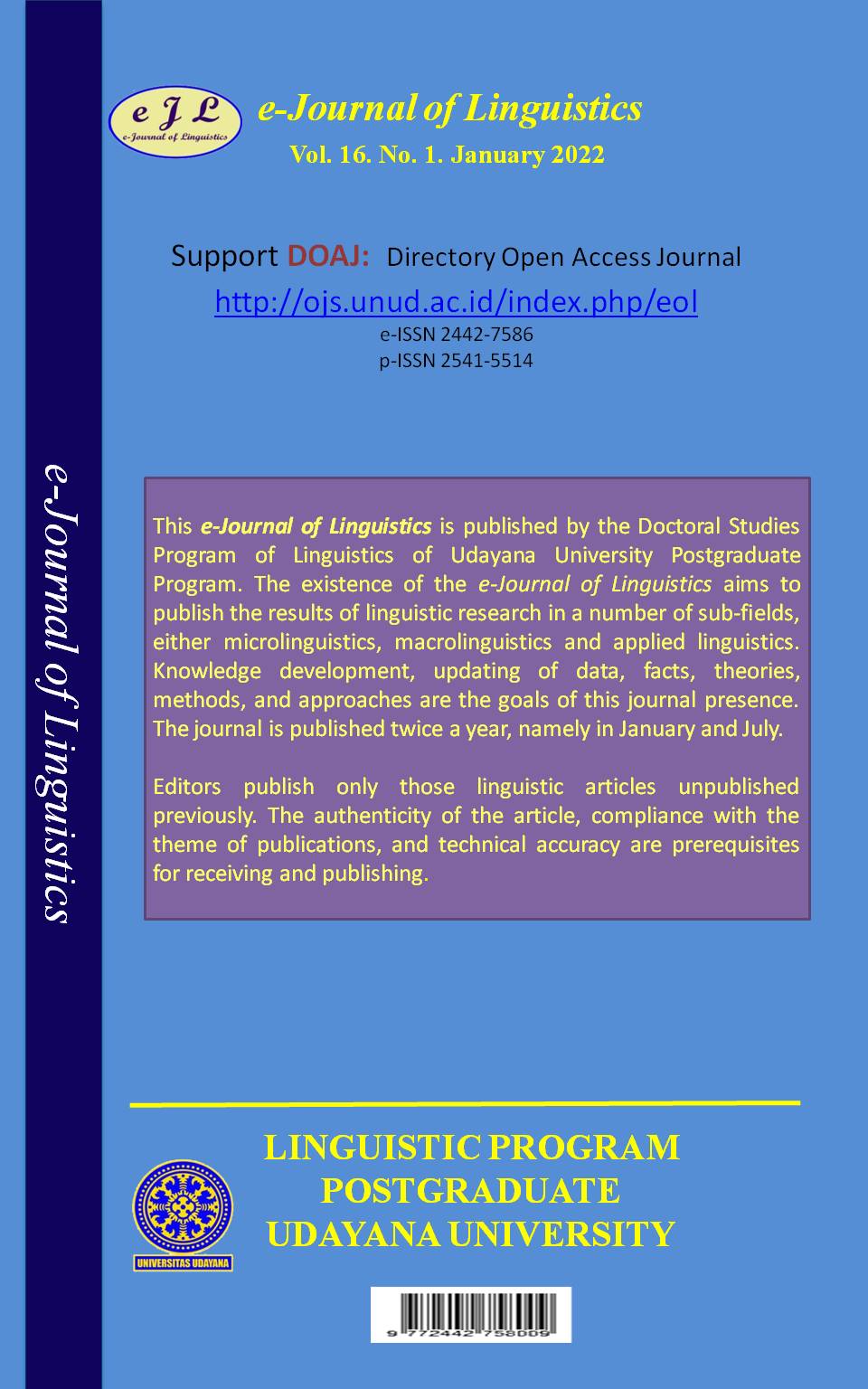Rediscovering Abdurrahman Wahid’s Ideas in Today’s Indonesia: the Use of Argumentative Devices in English Articles
Abstract
Recent issues on social and politics have become so influential in Indonesia that people are divided and become increasingly intolerant. In the era of intolerance it is quite right to rediscoverand analyse arguments of the late K.H. Abdurrahman Wahid, the fourth president of Indonesia that earned his reputation as an international religious scholar, a defender of pluralism, and a champion of humanity. This paper presents a discourse analysis on argumentative devices used byAbdurrahman Wahid in his English articles published at www.gusdur.net. Wahid used the eight argumentative devices masterfully in his articles. Evaluative expressive expressions were the most frequent argumentative device (31%). Wahid tended to show his value judgments bluntly, either positive or negative, to comment or react to current issues under discussion. Such an emotional tendency potentially came from Wahid’s own point of view that was based on things which were ideal for him, not on objective analyses made by other people.
Downloads
References
Arikunto, S. (2002). Pengantar metodologi penelitian. Jakarta: Erlangga.
Barton, G. (2016). Gus Dur: The authorized biography of Abdurrahman Wahid. Yogyakarta: LKiS.
Bogdan, R. & Biklen, S.K. (2007). Qualitative research for education (5th ed.). London: Pearson.
Bouma, G.& Carland, S. (2016). The research process. Melbourne: Oxford University Press.
Chaika, E. (2007). Language: The social mirror (4th ed.). Boston: Heinle ELT.
Creswell. (2012). Qualitative inquiry and research design (3rd ed,). California: Sage Publication, Inc.
Crystal, D. (1992). The Cambridge encyclopedia of language. New York: Cambridge University Press.
Emmit, M., & Pollock J. (1997). Language and learning (2nd Ed). Melbourne: Oxford University Press.
Fogelin, R.J. & Sinnott-Armstrong, W. (2014). Understanding arguments: An introduction to informal logic. Belmont: Wadsworth Publishing.
Johnson, B., & Christensen, L. (2000). Educational research: Qualitative and quantitative approaches. Boston: Allyn and Bacon.
Mahfud. Moh. (2003). A Year with Gus Dur: Reminiscences of a minister during hard times. Jakarta: LP3S.
Nurita, D. (2021, February 12). Perayaan Imlek, mengenang Gus Dur dan kisah pengantin Konghucu. Tempo. https://nasional.tempo.co/read/1432230/perayaan-imlek-mengenang-gus-dur-dan-kisah-pengantin-konghucu/full&view=ok.
Pojok Gus Dur. (2021, March 12). Biografi/The Life of K.H. Abdurrahman Wahid. https://www.gusdur.net/id/biografi.
Renkema, J. (2004). Discourse studies: An introductory textbook. Amsterdam: John Benjamins Publishing Co.
Richards, J.C., & Schmidt, R. (2002). Dictionary of language teaching and applied linguistics. London: Pearson Education Limited.
Rizal, J. G. (2020, December 7). Video viral alasan Gus Dur bubarkan kementerian sosial dan sejarahnya. Kompas. https://www.kompas.com/tren/read/2020/12/07/074500365/video-viral-alasan-gus-dur-bubarkan-kementerian-sosial-dan-sejarahnya?page=all.
Sukmadinata, R. (2005). Metodologi penelitian. Jakarta: Erlangga.
Tim Detikcom. (2020, December 7). Viral lagi! Gus Dur bubarkan kemensos di tengah mensos dicokok KPK. Detik. https://finance.detik.com/berita-ekonomi-bisnis/d-5285225/viral-lagi-gus-dur-bubarkan-kemensos-di-tengah-mensos-dicokok-kpk.
Utama, V. R. (2019). Menjerat Gus Dur. Jakarta: Numedia Digital Indonesia
Wahab, A. (2003). Classroom discussion. Malang: English Education Department, Postgraduate Program, Islamic University of Malang.

This work is licensed under a Creative Commons Attribution 4.0 International License











